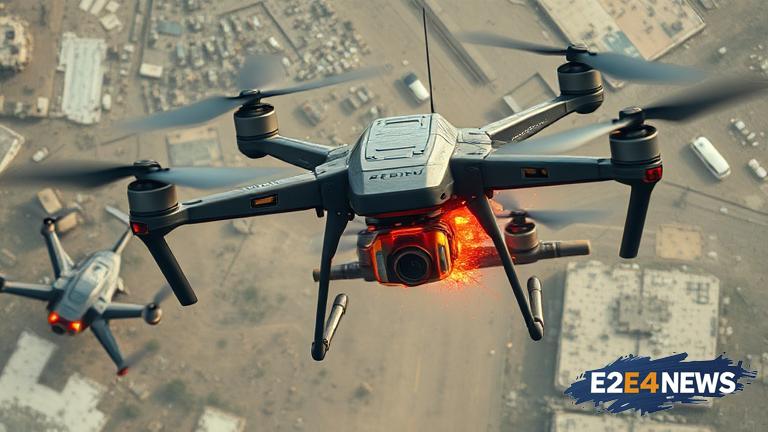The recent deployment of a Russian FPV (First-Person View) drone in a military operation has led to significant casualties, with reports indicating that the strike resulted in the loss of numerous lives. This incident highlights the growing importance of drone technology in modern warfare, where unmanned aerial vehicles (UAVs) are being increasingly utilized to carry out precision strikes. The use of FPV drones, in particular, has raised concerns due to their ability to provide real-time video feedback to the operator, allowing for more accurate targeting. The Russian military has been at the forefront of adopting drone technology, with a significant investment in the development and deployment of UAVs in various combat zones. The effectiveness of these drones has been demonstrated in several instances, including the recent strike, which has sparked a debate about the ethics of using such technology in warfare. Critics argue that the use of drones can lead to a disproportionate number of civilian casualties, while proponents claim that they provide a more precise and efficient means of engaging enemy targets. The Russian government has defended its use of drones, stating that they are a necessary tool in the fight against terrorism and insurgency. However, the international community has expressed concerns about the lack of transparency and accountability in the use of drone technology, particularly in conflicts where civilians are often caught in the crossfire. The United States and other Western nations have also been investing heavily in drone technology, with a focus on developing more advanced UAVs that can operate autonomously. The use of drones has also raised questions about the future of warfare, with some experts predicting that unmanned systems will play an increasingly prominent role in future conflicts. As the use of drones continues to evolve, it is likely that we will see more instances of FPV drone strikes, which will only add to the ongoing debate about the ethics and consequences of using such technology. The Russian FPV drone strike has also highlighted the need for greater transparency and accountability in the use of drone technology, particularly in conflicts where civilians are at risk. The international community must work together to establish clear guidelines and regulations for the use of drones, in order to prevent unnecessary harm to civilians and to ensure that the use of such technology is in line with international humanitarian law. In conclusion, the recent Russian FPV drone strike has significant implications for the future of warfare, and it is essential that we consider the ethical and moral implications of using such technology. The use of drones is likely to continue to play a major role in modern warfare, and it is crucial that we establish clear guidelines and regulations to ensure that their use is responsible and in line with international humanitarian law. The incident has also sparked a debate about the role of drone technology in modern warfare, with some experts arguing that it is a necessary tool in the fight against terrorism and insurgency, while others claim that it is a violation of human rights. The Russian government has faced criticism for its use of drones, with some accusing the country of violating international humanitarian law. The use of FPV drones has also raised concerns about the potential for civilian casualties, particularly in conflicts where the distinction between military and civilian targets is often blurred. The international community must work together to address these concerns and to establish clear guidelines for the use of drone technology in warfare. The Russian FPV drone strike is a significant incident that highlights the need for greater transparency and accountability in the use of drone technology, and it is essential that we consider the ethical and moral implications of using such technology in modern warfare.





